Kfir M. Cohen
Shitz
Cross-Validation Conformal Risk Control
Jan 22, 2024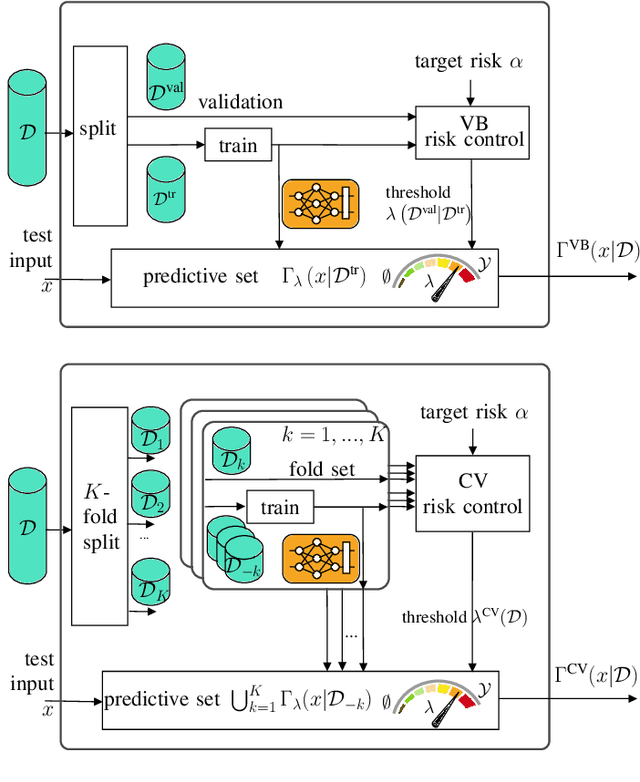
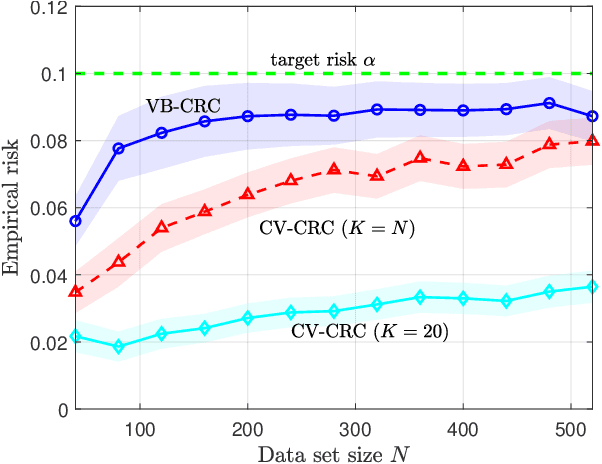
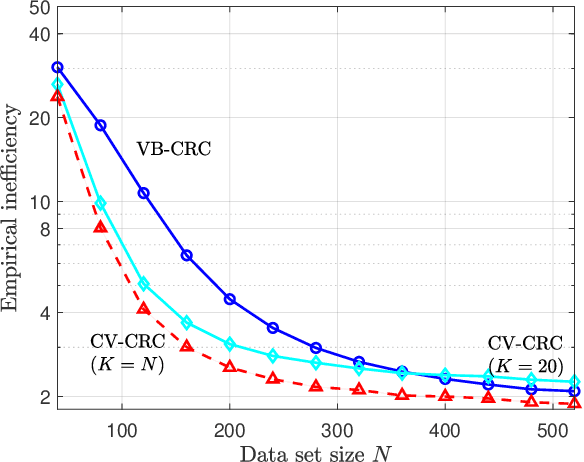
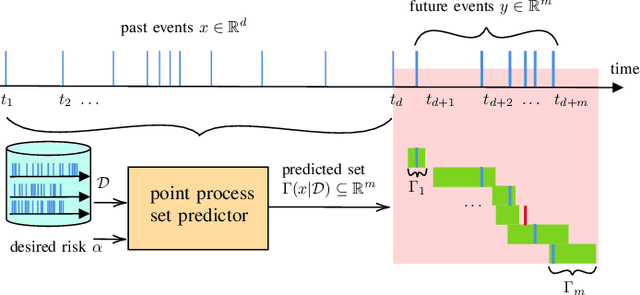
Abstract:Conformal risk control (CRC) is a recently proposed technique that applies post-hoc to a conventional point predictor to provide calibration guarantees. Generalizing conformal prediction (CP), with CRC, calibration is ensured for a set predictor that is extracted from the point predictor to control a risk function such as the probability of miscoverage or the false negative rate. The original CRC requires the available data set to be split between training and validation data sets. This can be problematic when data availability is limited, resulting in inefficient set predictors. In this paper, a novel CRC method is introduced that is based on cross-validation, rather than on validation as the original CRC. The proposed cross-validation CRC (CV-CRC) extends a version of the jackknife-minmax from CP to CRC, allowing for the control of a broader range of risk functions. CV-CRC is proved to offer theoretical guarantees on the average risk of the set predictor. Furthermore, numerical experiments show that CV-CRC can reduce the average set size with respect to CRC when the available data are limited.
Guaranteed Dynamic Scheduling of Ultra-Reliable Low-Latency Traffic via Conformal Prediction
Feb 15, 2023Abstract:The dynamic scheduling of ultra-reliable and low-latency traffic (URLLC) in the uplink can significantly enhance the efficiency of coexisting services, such as enhanced mobile broadband (eMBB) devices, by only allocating resources when necessary. The main challenge is posed by the uncertainty in the process of URLLC packet generation, which mandates the use of predictors for URLLC traffic in the coming frames. In practice, such prediction may overestimate or underestimate the amount of URLLC data to be generated, yielding either an excessive or an insufficient amount of resources to be pre-emptively allocated for URLLC packets. In this paper, we introduce a novel scheduler for URLLC packets that provides formal guarantees on reliability and latency irrespective of the quality of the URLLC traffic predictor. The proposed method leverages recent advances in online conformal prediction (CP), and follows the principle of dynamically adjusting the amount of allocated resources so as to meet reliability and latency requirements set by the designer.
Calibrating AI Models for Wireless Communications via Conformal Prediction
Dec 15, 2022Abstract:When used in complex engineered systems, such as communication networks, artificial intelligence (AI) models should be not only as accurate as possible, but also well calibrated. A well-calibrated AI model is one that can reliably quantify the uncertainty of its decisions, assigning high confidence levels to decisions that are likely to be correct and low confidence levels to decisions that are likely to be erroneous. This paper investigates the application of conformal prediction as a general framework to obtain AI models that produce decisions with formal calibration guarantees. Conformal prediction transforms probabilistic predictors into set predictors that are guaranteed to contain the correct answer with a probability chosen by the designer. Such formal calibration guarantees hold irrespective of the true, unknown, distribution underlying the generation of the variables of interest, and can be defined in terms of ensemble or time-averaged probabilities. In this paper, conformal prediction is applied for the first time to the design of AI for communication systems in conjunction to both frequentist and Bayesian learning, focusing on demodulation, modulation classification, and channel prediction.
Calibrating AI Models for Few-Shot Demodulation via Conformal Prediction
Oct 10, 2022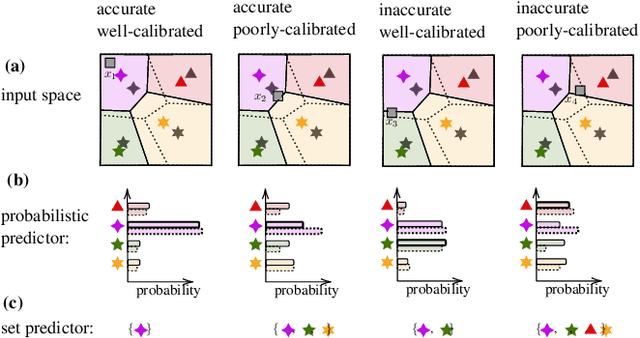
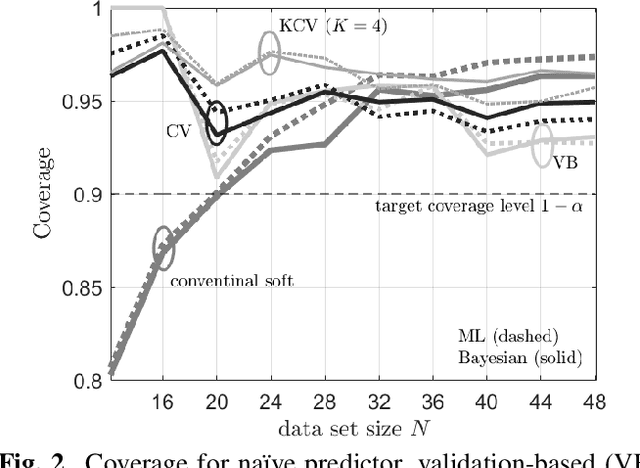
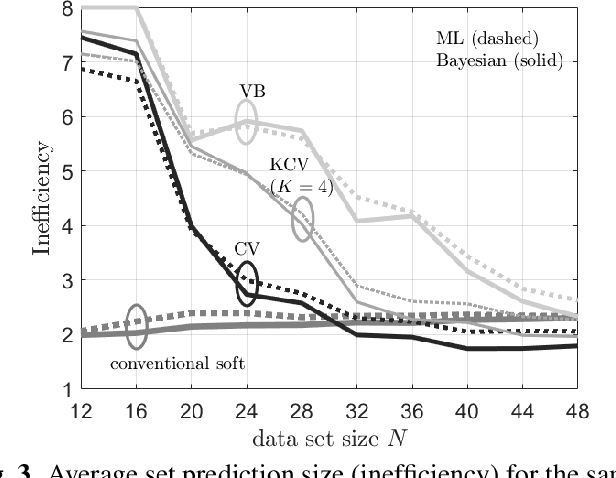
Abstract:AI tools can be useful to address model deficits in the design of communication systems. However, conventional learning-based AI algorithms yield poorly calibrated decisions, unabling to quantify their outputs uncertainty. While Bayesian learning can enhance calibration by capturing epistemic uncertainty caused by limited data availability, formal calibration guarantees only hold under strong assumptions about the ground-truth, unknown, data generation mechanism. We propose to leverage the conformal prediction framework to obtain data-driven set predictions whose calibration properties hold irrespective of the data distribution. Specifically, we investigate the design of baseband demodulators in the presence of hard-to-model nonlinearities such as hardware imperfections, and propose set-based demodulators based on conformal prediction. Numerical results confirm the theoretical validity of the proposed demodulators, and bring insights into their average prediction set size efficiency.
Few-Shot Calibration of Set Predictors via Meta-Learned Cross-Validation-Based Conformal Prediction
Oct 06, 2022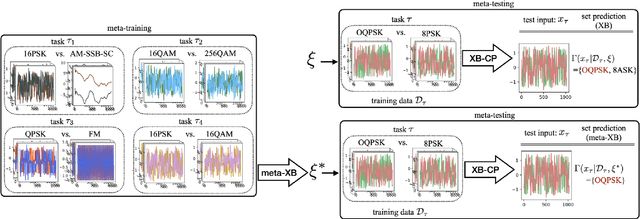
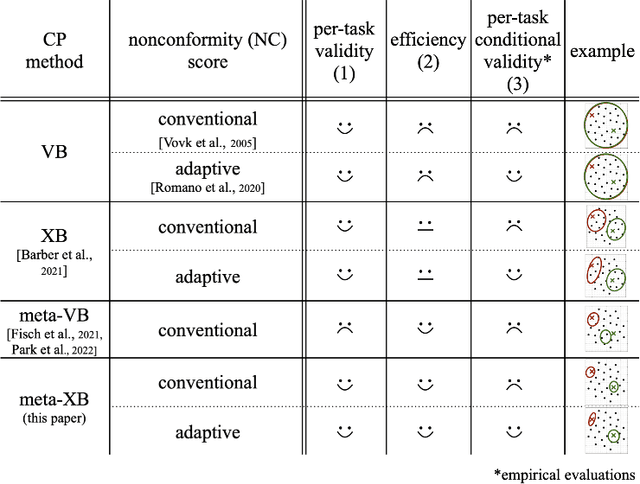
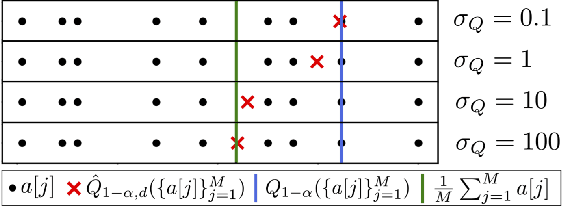
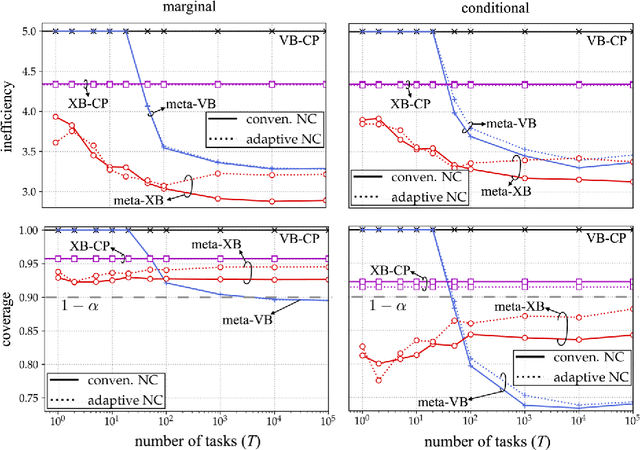
Abstract:Conventional frequentist learning is known to yield poorly calibrated models that fail to reliably quantify the uncertainty of their decisions. Bayesian learning can improve calibration, but formal guarantees apply only under restrictive assumptions about correct model specification. Conformal prediction (CP) offers a general framework for the design of set predictors with calibration guarantees that hold regardless of the underlying data generation mechanism. However, when training data are limited, CP tends to produce large, and hence uninformative, predicted sets. This paper introduces a novel meta-learning solution that aims at reducing the set prediction size. Unlike prior work, the proposed meta-learning scheme, referred to as meta-XB, (i) builds on cross-validation-based CP, rather than the less efficient validation-based CP; and (ii) preserves formal per-task calibration guarantees, rather than less stringent task-marginal guarantees. Finally, meta-XB is extended to adaptive non-conformal scores, which are shown empirically to further enhance marginal per-input calibration.
Learning to Learn to Demodulate with Uncertainty Quantification via Bayesian Meta-Learning
Aug 02, 2021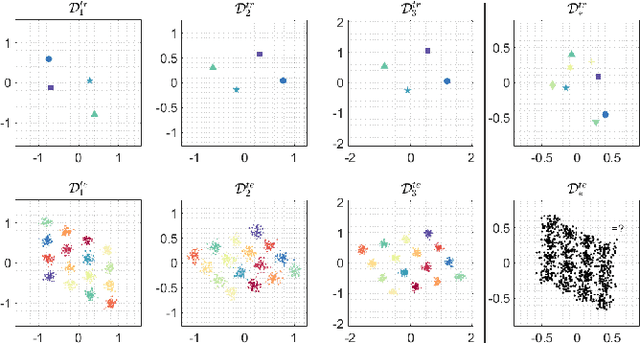
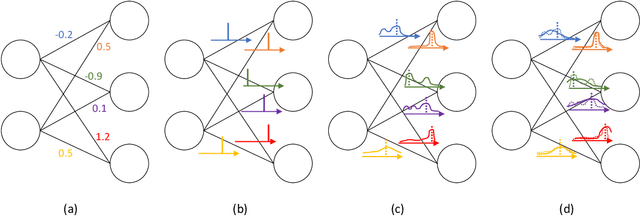
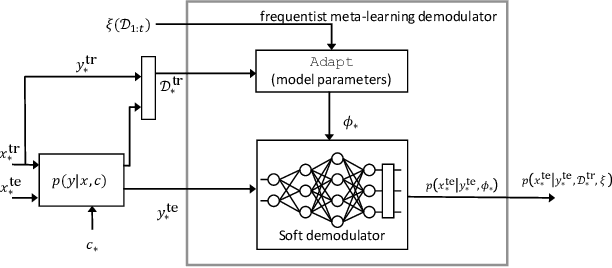
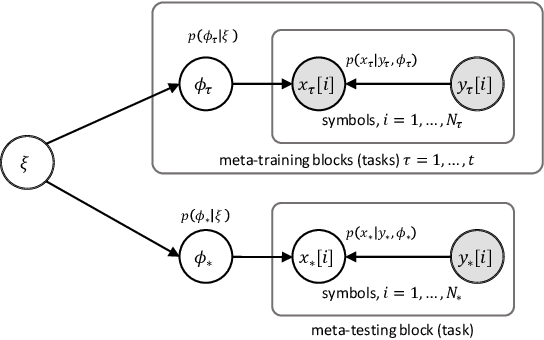
Abstract:Meta-learning, or learning to learn, offers a principled framework for few-shot learning. It leverages data from multiple related learning tasks to infer an inductive bias that enables fast adaptation on a new task. The application of meta-learning was recently proposed for learning how to demodulate from few pilots. The idea is to use pilots received and stored for offline use from multiple devices in order to meta-learn an adaptation procedure with the aim of speeding up online training on new devices. Standard frequentist learning, which can yield relatively accurate "hard" classification decisions, is known to be poorly calibrated, particularly in the small-data regime. Poor calibration implies that the soft scores output by the demodulator are inaccurate estimates of the true probability of correct demodulation. In this work, we introduce the use of Bayesian meta-learning via variational inference for the purpose of obtaining well-calibrated few-pilot demodulators. In a Bayesian framework, each neural network weight is represented by a distribution, capturing epistemic uncertainty. Bayesian meta-learning optimizes over the prior distribution of the weights. The resulting Bayesian ensembles offer better calibrated soft decisions, at the computational cost of running multiple instances of the neural network for demodulation. Numerical results for single-input single-output Rayleigh fading channels with transmitter's non-linearities are provided that compare symbol error rate and expected calibration error for both frequentist and Bayesian meta-learning, illustrating how the latter is both more accurate and better-calibrated.
 Add to Chrome
Add to Chrome Add to Firefox
Add to Firefox Add to Edge
Add to Edge